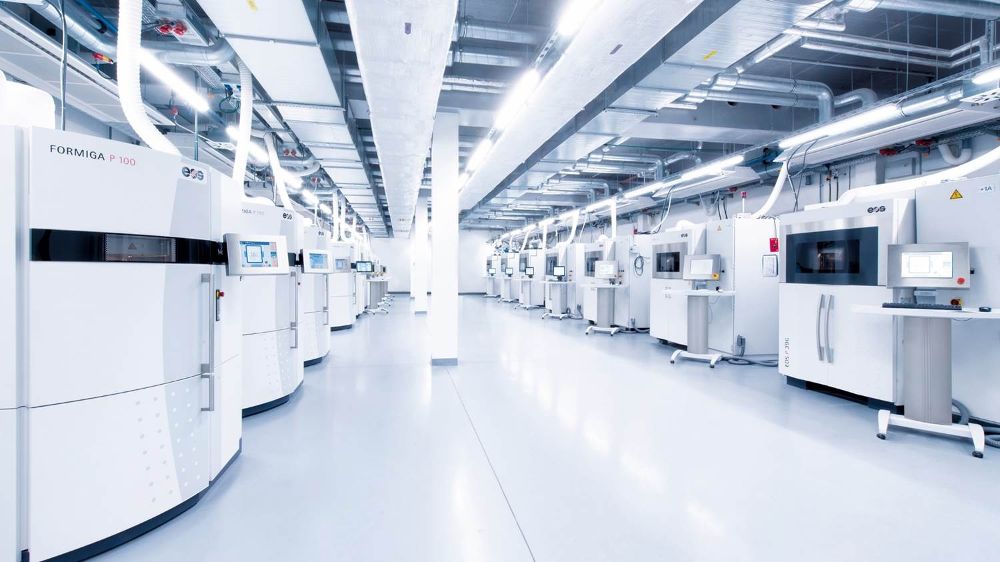Leading 3D printer manufacturer EOS has been selected as part of the 50 Sustainability and Climate Leaders initiative, a climate action-focused project from the international business community that gives companies a platform to work to combat climate change.
Alongside representing the 3D printing sector within the initiative, EOS is introducing a “holistic sustainability approach” that seeks to promote responsible manufacturing and ensure future production is less harmful to the planet. The strategy will involve supporting its customers in achieving their own sustainability targets regarding energy efficiency, waste reduction, and conscious use of resources.
“Sustainable thinking has always been in our company DNA,” said Marie Langer, CEO of EOS. “We have the innovative power and mindset to make a difference. All of this is a team effort, and we invite partners and customers to join us on this journey and support our goal of establishing responsible manufacturing as the new normal.”

Leading responsible manufacturing
Upon being appointed CEO of EOS in October 2019, Langer stated her leadership would see the company do more with the “positive environmental and social benefits” of 3D printing. The company describes itself as being “deeply committed” to fulfilling customer needs while “acting responsibly” for the planet, and is driving its sustainability approach forwards by joining the 50 Sustainability and Climate Leaders initiative.
EOS will work with its customers to foster more responsible manufacturing approaches that deliver improved energy efficiency, help to reduce waste, and lead to a more conscious use of resources at each stage of the manufacturing process.
“The earth is the most valuable resource that we have yet keeping the balance between living well and respecting the natural resources of our planet is challenging,” added Björn Hannappel, Head of Sustainability for EOS Group. “Responsible manufacturing is our approach to contribute to a more sustainable future.
“Combining financial performance with a positive social and environmental impact through our business is what we are aiming at.”
Technology that is responsible by design
In comparison to many subtractive manufacturing processes, 3D printing can enable the production of more lightweight parts and solve complex manufacturing challenges while minimizing waste. Regarding materials, EOS is developing more bio-based and bio-degradable materials for additive manufacturing with a vision of zero waste in mind.
The company is working with its customers to develop more customized industrial 3D printing applications that offer less material consumption, limit over-production, and reduce waste. The firm has also conducted studies with selected customers and research institutes that reveal the potential of deploying 3D printing to reduce carbon emissions, and is seeking to continually improve its own systems and processes to reduce energy consumption and improve operational efficiency.
EOS also highlights how industrial 3D printing has enabled on-demand, local production during the Covid-19 pandemic, plugging supply chain gaps with decentralized production of in-demand products such as medical devices and personal protective equipment (PPE). Beyond Covid, the company foresees the integration of additive manufacturing into supply chains to make them more resilient and able to adapt to future disruptions.
In light of this, EOS predicts a growing number of customers will invest in industrial 3D printing technology in order to enable digital, on-demand production of spare parts which will subsequently yield reduced warehousing and global transportation of parts.
“Responsible manufacturing is a journey – we as an organization are transforming too, embracing it to become a more purpose-driven and diverse organization,” added Langer.

Recent sustainability advances in AM
Improving sustainability within 3D printing processes and technologies is an area that is seeing continual developments, from materials-focused research into new bio-based materials to the repurposing of waste for 3D printing feedstock.
In February, the Smart Fusion Material Research Cluster brought together interdisciplinary teams from Wichita State, the University of Kansas, and Kansas State University, to advance sustainable practices in metal 3D printing design and manufacturing processes. Through deploying a data analytic algorithm, the partners hope to explore material design and manufacturing as an ecological system made up of individual, technology, infrastructure, and social environments.
Regarding new material developments, Czech 3D printing filament producer Fillamentum recently launched its first 100 percent biodegradable filament for 3D printing, called NonOilen, while 3D printing materials company Polymaker unveiled its latest PLA-based filament which is engineered to be tougher and impart less of an environmental impact. Meanwhile, South Korean 3D printer manufacturer Sindoh’s newest 3D printer has become the first commercial machine to offer Materialise’s Bluesint PA12 process technology, enabling 3D printing with up to 100 percent recycled powder.
Elsewhere, EU-funded project NOVUM is aiming to address global awareness around resource sufficiency, climate change, and the circular economy by exploring cellulose as a substitute for fossil-based materials for automotive, marine, and electrical insulation applications. Most recently, post-processing specialist Additive Manufacturing Technologies (AMT) received an £87,000 Innovate UK grant to develop a new organic solvent for the post-processing of elastomers and accelerate sustainability within the post-processing market.
There has also been a flurry of recent activity in the repurposing of waste to produce 3D printing materials. The University of Louisville’s Conn Center for Renewable Energy Research is currently developing a process that transforms soy hulls left over from soybean processing into 3D printable materials, while the BARBARA project recently concluded four years of research into developing new 3D printable materials from food waste and agricultural by-products such as pomegranate, lemon, almond shell, and corn.
Subscribe to the 3D Printing Industry newsletter for the latest news in additive manufacturing. You can also stay connected by following us on Twitter and liking us on Facebook.
Looking for a career in additive manufacturing? Visit 3D Printing Jobs for a selection of roles in the industry.
Featured image shows a factory of EOS machines. Photo via EOS.


